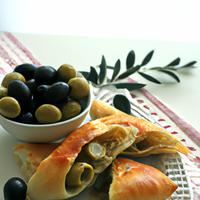
1 serving (100 grams) contains 300 calories, 6.0 grams of protein, 18.0 grams of fat, and 30.0 grams of carbohydrates.

Log this food in SnapCalorie

Nutrition Information
Calories |
714.3 | ||
|---|---|---|---|
% Daily Value* |
|||
| Total Fat | 42.9 g | 55% | |
| Saturated Fat | 11.9 g | 59% | |
| Polyunsaturated Fat | 0 g | ||
| Cholesterol | 23.8 mg | 7% | |
| Sodium | 952.4 mg | 41% | |
| Total Carbohydrates | 71.4 g | 25% | |
| Dietary Fiber | 4.8 g | 17% | |
| Sugars | 4.8 g | ||
| protein | 14.3 g | 28% | |
| Vitamin D | 0 mcg | 0% | |
| Calcium | 119.0 mg | 9% | |
| Iron | 4.8 mg | 26% | |
| Potassium | 238.1 mg | 5% | |
* Percent Daily Values are based on a 2,000 calorie diet. Your daily values may be higher or lower depending on your calorie needs.
Food Attributes
Source of Calories
About Borekas with olive
Borekas with olive is a savory pastry originating from Sephardic Jewish and Turkish cuisines, reflecting a vibrant Middle Eastern and Mediterranean heritage. These flaky hand-folded pockets are traditionally made with phyllo or puff pastry and stuffed with a flavorful olive mixture that may include finely chopped olives, herbs, and sometimes cheese or spices. Rich in healthy fats from the olives, borekas provide an excellent source of monounsaturated fats that support heart health. They also deliver antioxidants like vitamin E and polyphenols naturally found in olives. However, phyllo or puff pastry is often high in butter or oil, making borekas calorically dense and best enjoyed in moderation. With a delightful balance of creamy, salty, and crispy textures, borekas with olive are a satisfying appetizer or snack—ideal for anyone seeking a taste of Mediterranean cuisine, but mindful of portion size and occasional indulgence.



